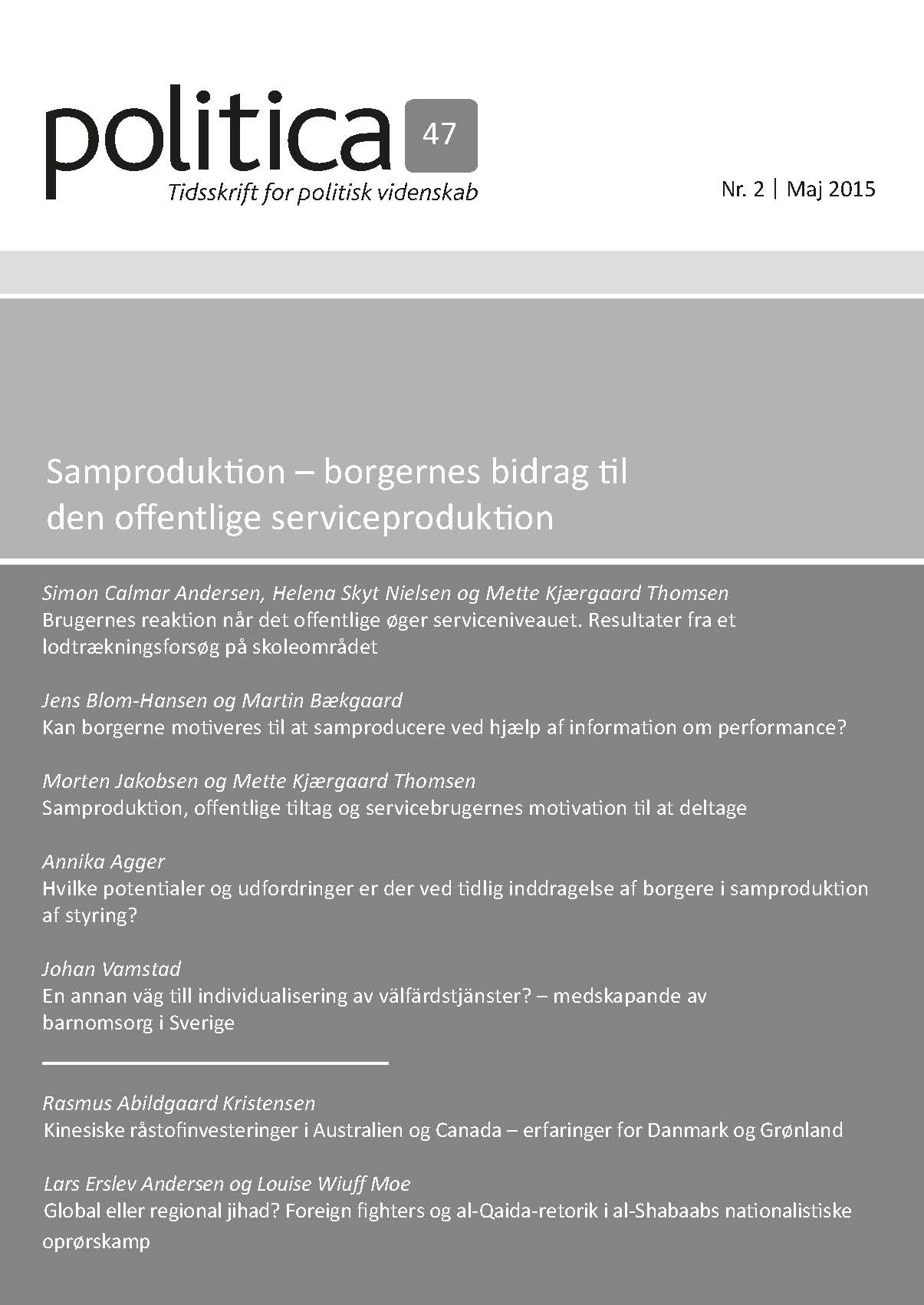Samproduktion, offentlige tiltag og servicebrugernes motivation til at deltage
DOI:
https://doi.org/10.7146/politica.v47i2.131464Resumé
Offentlige serviceydelser tilvejebringes ofte via samproduktion, dvs. gennem et miks af input fra offentligt ansatte og de brugere, som modtager serviceydelserne. Eftersom brugernes bidrag kan føre til en forbedring af kvaliteten og mængden af de offentlige serviceydelser, bliver der i stigende omfang iværksat offentlige samproduktionstiltag, som har til formål at øge brugernes bidrag. På baggrund af den eksisterende forskning ved vi meget lidt om, hvilken effekt sådanne tiltag har på servicebrugernes motivation til at samproducere. Ved brug af et empirisk eksempel fra folkeskoleområdet tester vi effekten af et samproduktionstiltag på forældrenes intrinsiske og ekstrinsiske motivation. Hovedresultatet er, at samproduktionstiltaget navnlig for lavtuddannede forældre har en negativ effekt på deres intrinsiske motivation. Dette resultat understreger vigtigheden af, at offentlige myndigheder, som iværksætter tiltag af denne art, er opmærksomme på eventuelle utilsigtede motivationseffekter, som kan betyde, at den tilsigtede adfærdsændring ikke indfries.
Referencer
Adair, John G. (1984). The Hawthorne effect: A reconsideration of the methodological artifact. Journal of Applied Psychology 69 (2): 334-345.
Alford, John (2002). Why do public-sector clients coproduce? Toward a contingency theory. Administration & Society 34 (1): 32-56.
Alford, John (2009). Engaging Public Sector Clients: From Service-Delivery to Co-production. Houndmills, UK: Palgrave Macmillan.
Andersen, Lotte B. og Lene H. Pedersen (2014). Styring og motivation i den offentlige sektor. København: DJØF.
Brudney, James L. (1983). The evaluation of coproduction programs. Policy Studies Journal 12 (2): 376-385.
Deci, Edward L. 1971. Effects of externally mediated rewards on intrinsic motivation. Journal of Personality and Social Psychology 18 (1): 105-115.
Deci, Edward L., Richard Koestner og Richard M. Ryan (1999). A meta-analytic review of experiments examining the effects of extrinsic rewards on intrinsic motivation. Psychological Bulletin 125 (6): 627-668.
Frey, Bruno S. (1997). Not Just for the Money: An Economic Theory of Personal Motivation. Cheltenham, UK: Edward Elgar.
Gagne, Marylene og Edward L. Deci (2005). Self-determination theory and work motivation. Journal of Orgazational Behavior 26 (4): 331-362.
Jakobsen, Morten (2013). Can government initiatives increase citizen coproduction? Results of a randomized field experiment. Journal of Public Administration Research and Theory 23 (1): 27-54.
Jakobsen, Morten og Simon C. Andersen (2013). Coproduction and equity in public service delivery. Public Administration Review 73 (5): 704-713.
Jakobsen, Morten og Søren Serritzlew (under udg.). Can government educate citizens? A field experiment on knowledge effects of information provision. International Journal of Public Administration.
Nesbit, Line S. og Maiken K. Milthers (2013). Motivation for coproduction. Et eksperimentelt studie af information som motivationsfremmende redskab. Speciale. Institut for Statskundskab, Aarhus Universitet.
Ostrom, Elinor (1996). Crossing the great divide: coproduction, synergy, and development. World Development 24 (6): 1073-1087.
Parks, Roger B., Paula C. Baker, Larry Kiser, Ronald Oakerson, Elinor Ostrom, Vincent Ostrom, Stephen L. Percy, Martha B. Vandivort, Gordan P. Whitaker og Rich Wilson (1981). Consumers as coproducers of public services - some economic and institutional considerations. Policy Studies Journal 9 (7): 1001-1011.
Percy, Stephen L. (1984). Citizen participation in the coproduction of urban services. Urban Affairs Review 19 (4): 431-446.
Porter, David O. (2012). Co-production and network structures in public education, pp. 145-168 i Victor Pestoff, Taco Brandsen og Bram Verschuere (red.), New Public Governance, the Third Sector, and Co-Production. New York: Routledge.
Rosentraub, Mark S. og Elaine B. Sharp (1981). Consumers as producers of social services: coproduction and the level of social services. Southern Review of Public Administration 4 (4): 502-539.
Reeve, Johnmarshall og Edward L. Deci (1996). Elements of the competitive situation that affect intrinsic motivation. Personality and Social Psychology Bulletin 22 (1): 24-33.
Reeve, Johnmarshall, Glen Nix og Diane Hamm (2003). Testing models of the experience of self-determination in intrinsic motivation and the conundrum of choice. Journal of Educational Psychology 95 (2): 375-392.
Ryan, Richard M. og Edward L. Deci (2000a). Intrinsic and extrinsic motivations: classic definitions and new directions. Contemporary Educational Psychology 25 (1): 54-67.
Ryan, Richard M. og Edward L. Deci (2000b). Self-determination theory and the facilitation of intrinsic motivation, social development, and well-being. American Psychologist 55 (1): 68-78.
Sharp, Elaine B. (1980). Toward a new understanding of urban services and citizen participation: The coproduction concept. The American Review of Public Administration 14 (2): 105-118.
Thomsen, Mette K. og Morten Jakobsen (under udg.). Influencing citizen coproduction by sending encouragement and advice: a field experiment. International Public Management Journal.
Vamstad, Johan (2012). Co-production and service quality: a new perspective for the Swedish welfare state, pp. 297-316 i Victor Pestoff, Taco Brandsen og Bram Verschuere (red.), New Public Governance, the Third Sector, and Co-Production. New York: Routledge.
van Eijk, Carola J. A. og Trui P. S. Steen (2014). Why people co-produce: Analysing citizens’ perceptions on co-planning engagement in health care services. Public Management Review 16 (3): 358-382.
Warren, Robert, Mark S. Rosentraub og Karen S. Harlow (1984). Coproduction, equity, and the distribution of safety. Urban Affairs Review 19 (4): 447-464.
Weibel, Antoinette, Katja Rost og Margit Osterloh (2010). Pay for performance in the public sector-benefits and (hidden) costs. Journal of Public Administration Research and Theory 20 (2): 387-412.
Downloads
Publiceret
Citation/Eksport
Nummer
Sektion
Licens
LicensOphavsretten tilhører Politica. Materialet må ikke bruges eller distribueres i kommercielt øjemed.





